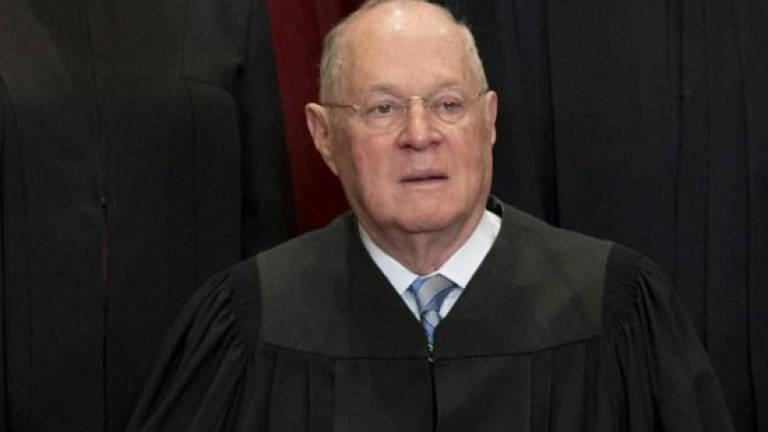Anthony Kennedy, the Supreme Court's swing vote

WASHINGTON: As the US Supreme Court prepares to hear arguments Tuesday in the highly anticipated "gay wedding cake" case, all eyes are once again on Justice Anthony Kennedy, the fulcrum upon which the bench has turned for a decade.
The case, which pits Christian conservatives against progressives and the LGBT community, concerns a Colorado baker who, due to his religious beliefs, refused to bake a wedding cake for a gay couple.
The court will have to decide between three constitutional rights – sexual equality, freedom of religion and freedom of expression.
The stakes are high, and could open the door for conservative businesses to spurn gay couples.
Eighty-one-year-old Kennedy, who was appointed by Republican president Ronald Reagan in 1987 and is the court's longest serving judge, is widely expected to provide the decisive vote.
Kennedy is to the Supreme Court what swing states are to elections.
Conservative on firearms and election financing, he can be more progressive on issues such as abortion and affirmative action.
On a bench comprising four progressive and four conservative judges, his view often tips the balance.
An example of this came in 2015, when, thanks to him, same-sex marriage was legalised across the United States.
The judge, of Irish origin, then drafted the landmark ruling – just as he drafted the decision in "Lawrence v Texas" in 2003, which declared a state law forbidding sodomy illegal.
A clash of interests
But will the elderly judge, a practicing Catholic, vote in favor of the LGBT community in this latest case? It's a question currently frustrating experts.
The Trump administration, around twenty American states, dozens of members of Congress and countless Christian and conservative pressure groups have backed Jack Phillips, the baker.
These supporters have sent the Supreme Court many arguments, which seem to directly address Kennedy.
Steven Schwinn, Professor of Law at the University of Chicago, told AFP he believes the judge will "struggle" with the decision.
"I think he'll see this case as a clash of interests: the dignity and equality interest of the same-sex couple, on the one hand, and the religious freedom and free-speech interests of the cake-baker, on the other," he said.
"I imagine that he'll probably struggle with how to balance these."
"I think he's going to be torn," was the view of Louise Melling, deputy legal director of the American Civil Liberties Union.
"He's distracted by the deep faith of Jack Phillips. Jack Phillips is a person of faith and runs his bakery consistent with his faith, he has a small family business. We know that Justice Kennedy will care about that, there is no question," she said.
"On the other hand, Justice Kennedy cares deeply about the LGBT community," Melling added.
Moral rigor
Another question is how Kennedy can vote in Phillips' favor, without opening "the floodgates for discrimination against gays and lesbians in marriage services and beyond," says Schwinn.
"I do not think he wants to open that door," Erwin Chemerinsky, Dean of Berkeley Law and constitutional law expert, told AFP.
During the hearing on Tuesday, every word uttered by Anthony Kennedy will be under scrutiny – with supporters from both sides searching for signs of his position.
Reassuring Christian conservatives will be the Harvard Law School graduate's days as a choir boy in California – not to mention his marriage of over half a century to the same woman, with whom he has three children.
Indeed, Kennedy has a reputation for moral rigor sometimes regarded as prudishness.
While he was a university student, he traveled Europe in a red Volkswagen.
His father offered him a bottle of whiskey for the trip – but he did not drink it, instead using it only to gargle when he had a sore throat. — AFP